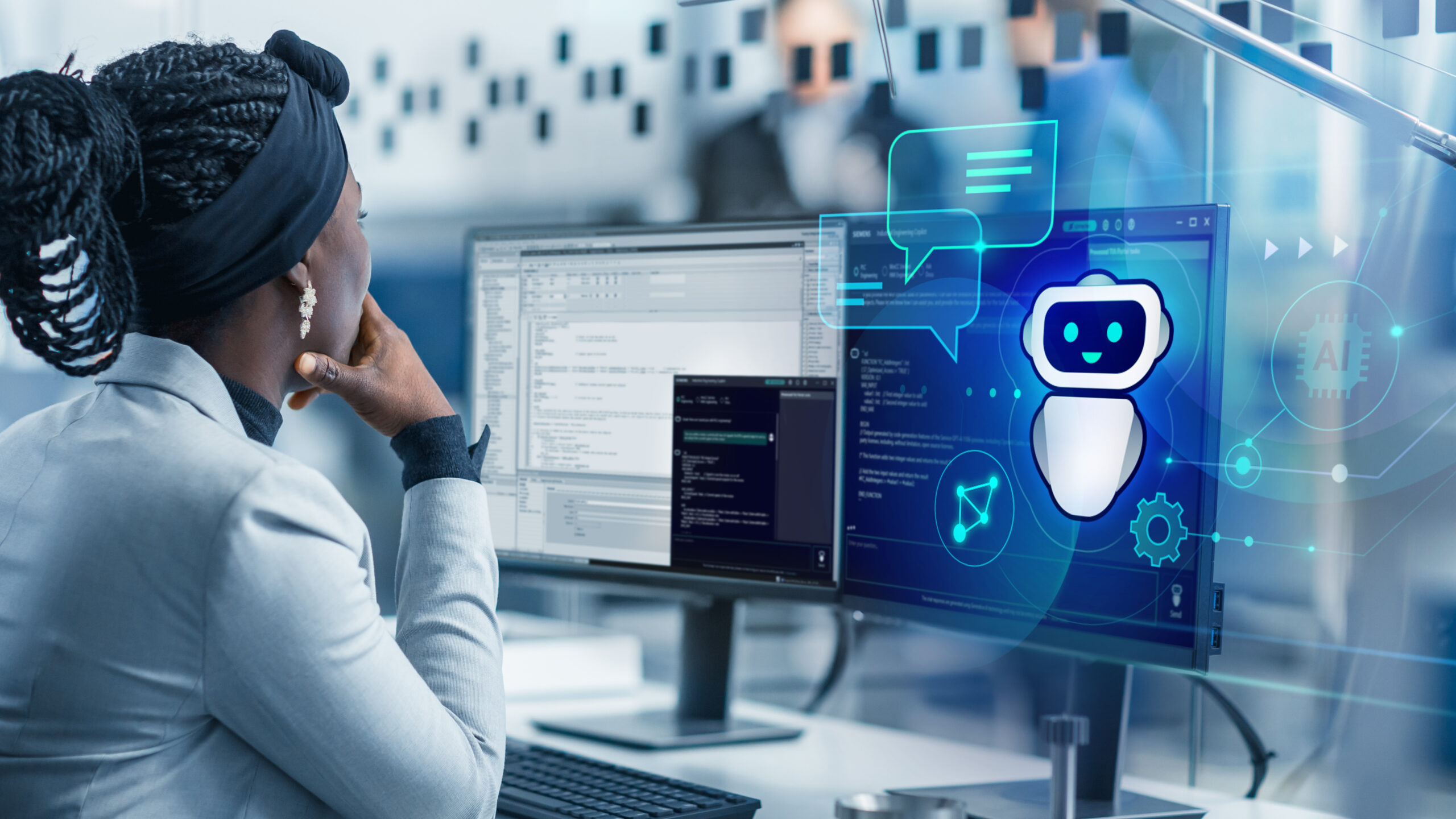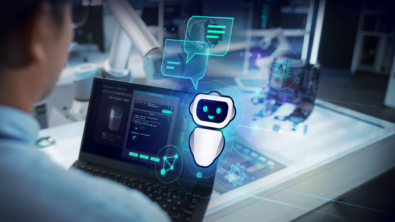Going beyond automation with the Industrial Copilot Transcript – Part 3

In a recent podcast, host Spencer Acain was joined by gusts Michi Lebacher and Alessia Bortolotti to examine the applications of generative AI, in the form of the Industrial Copilot, across every level of the engineering value chain. Listen to the full conversation here, or read along with this transcript.
Spencer Acain:
Hello, and welcome to the AI Spectrum podcast. I’m your host, Spencer Acain. In this series, we explore a wide range of AI topics from all across Siemens and how they’re applied to different technologies. Today, I’m joined by Michi Lebacher, head of AI and Digital Business at Siemens, and Alessia Bortolotti, customer discovery manager at Siemens AG. Continue our discussion on the topic of AI and the industrial copilot.
To continue the discussion from where we left off last time, we were looking at how these industrial copilots can’t be a one-size-fits-all for every user application or data type, and how you’re developing a wide range of tools and models that are suitable for different uses and how we really just scratched the tip of the iceberg on this. So what are some of the areas you see AI expanding in the future in this area? Where will it be in next few years, next 10 years or what?
Alessia Bortolotti:
So as you exactly said, you are right, we are still at the low-hanging fruit. We know that there is so much more that we can explore. One example could be maybe going more into optimization, like the overall equipment effectiveness here, focusing maybe or optimizing more availability, quality, performance. These are the main KPIs that customers are looking at when starting innovating. These are the goals that they need to achieve. So it’s for sure an expanding topic.
Another area could be maybe focusing not only on one machine, but really looking at the whole factory or how to improve even multiple factories, not only one. And as a last potential area or topic, I would say when we talk about chatbot interface, where we talk about actually in general generative AI, we always, or almost immediately think about ChatGPT, right?
And here, I think we could go even beyond that and we could maybe think about more closed-loop AI technology. So not only interact with a chatbot, but really let it solve some errors on its own, so without needing human intervention, so it can be solving some really simple tasks like adjusting a parameter, for example, and let the human take care of other tasks that maybe the copilot, the generative AI technology, cannot solve in that moment. Did I miss something?
Michi Lebacher:
No, no, no, no. I just want to stress, again, this idea you just outlined essentially this going beyond chatbot. I mean, it’s great that we have chatbot interfaces and this technology now. It’s great that we can interact now with chatbots and doing super intelligent things and also get a lot of support. But I mean, coming from factory automation, in the end, having a copilot that assists you is nice and definitely the right step in the right direction, but we need to optimize even more, right?
So this is behind, I think also, what you wanted to express, Alessia, is what can we do else to utilize generative AI or AI in general to achieve much more automation? I mean, we already have a whole portfolio for AI, and we already help our customers to automatize with AI. And I typically think about AI in terms of this is simply the next step of automation, and therefore also the next step of industrial automation.
So by now, it’s usual that you do visual quality inspection with AI. So often people don’t even recognize now this as AI because it’s simply visual quality inspection. But de facto, it’s AI that helps to automize. And I believe if we think beyond the chatbot interface that everyone has in its mind, like Alessia said, like ChatGPT, and think about the ways we could use that to automize, that it automatically programmed something, that it automatically triggers some things, that it works together with agents, which is also a huge topic, that do something for you such that you don’t need to do it again. We will leverage even more efficiency gains. So this is where I personally believe that the real hot topic and interesting future will lie. Yeah.
Spencer Acain:
I see. I mean, it sounds like you’ve got a bit of a plan there where this is going to go, where this is what you see, where you see the future, what you see the future bringing for AI and industrial copilot and all of that. I guess to kind of round things out here, too, I would like to maybe ask you what are some of the major challenges you faced with bringing these type of AI-enabled tools into industry, especially into areas that rely on exact and very accurate predictions or inferences from these models?
Alessia Bortolotti:
Yeah, thinking about this AI tools in general, the first main challenge that I think we got from customers is data privacy, data security. There is always this concern that the data aren’t safe in the cloud, so they are really reluctant to share that on the cloud.
Another challenge that we recognize is the more ethical one. So customers are fearing that the AI, specifically generative AI, could replace their work, could replace manpower. Here, I mean, what it’s important is that AI won’t replace anything. It’s more like assisting, supporting the work of the employees.
The next challenge that we see is also the reliability of AI. So companies that maybe are not so innovative yet but would like to start with AI, they often also don’t really know what AI is, what it’s behind that. It’s more like a black box for them, and so they don’t really know if they can trust the results, if in case of in general, so chatbot, if they can trust the answers. So here, our goal is to collect all these challenges and see then how we can turn this into opportunities, how we can then fulfill or address these kind of concerns and see then how to make them and show the customers then the benefits of our concepts. Maybe here, Michi, you could add-
Michi Lebacher:
I mean, the goal is obviously not to leave now the listeners only with the challenges because it’s exactly right like Alessia said. The cool thing is all of that can be turned into huge opportunities. So you mentioned the data privacy and security aspect. So yes, of course this is important. This is what really matters. You don’t want that you have a data breach with your sensitive data from your production hall. So this is your IP as a producer. This is where your secret sauces, where your recipes are, so it must be absolutely sure that the data is safe and that no one is misusing the data.
But it’s a huge opportunity, because together, we can make it safe. So if you go with Siemens, you do it with the best. And I mean, this is our goal here, and I would say you can leverage so much if you make it safe enough. So huge opportunity here, not only for gen AI, by the way. I believe that if we take the safety aspect serious, and we do, then you can leverage even more from your data.
The other thing is kind of like all these ethical considerations. I really believe that the problem is not so much anymore, does AI replace me? It’s really, at least in Europe, I see mainly the fear that we don’t get enough people that can do the job and they are simply asking for how can we become more efficient? How can you replace some of the boring working steps? How can we do it with the limited labor force and the labor shortage? So I would say it’s much more an opportunity than a challenge, actually. And I would say it’s never a goal to deploy AI systems to lay off people. It’s always to make them better, to enhance them and to cope with labor shortage.
And the other thing is, in general ethical considerations, we are also living, now speaking for Europe and Germany, also in a space that’s strongly regulated. And of course, we are fully compliant to GDPR and all these standards because that’s important and that matters to us. And I believe if we fulfill all these criterias with data privacy, we never will allow, for example, leakage of the data of, let’s say, a maintenance engineer that does something with the system that then is misused in some way. So I think huge opportunity if you do it right.
And the other thing is can we trust AI model and is it reliable? Also here, as I already said, our ambition is to be industrial-grade. So kind of the huge opportunity that we see here is becoming the one player that really can deliver industrial-grade because we put a lot of effort on all levels of this company into the validation of models, into evaluation, to really make sure that both the models that we select as well as the application really deliver up to the high standards we set ourselves.
So also would say that’s an opportunity of turning something that’s like not industrial-grade into something hardened. And I mean, one last thing, I mean, I don’t think it was among the challenges you listed, but what’s also important when it comes to turning challenges into opportunities is the way we do it at the moment, of doing it so closely together with the customers, because at the moment, we don’t make the mistake that we in our secret chamber work on something and after one year we push it out to the market, but we do it exactly the other way around.
So we do it together with pilot customers. We try to integrate their feedback. We also try to learn from their challenges because those could be also our challenges. And we allow that all these approaches we have along the value chain, that they can adapt, and that they give all the freedom to the customers, that they can be configured to put their own needs and challenges. So in the end, all the points outlined are in fact opportunities, I would say. And I guess that qualifies for a good ending.
Spencer Acain:
Yeah, I mean, that was I think a great place to end it, like you said. So I’d like to thank you both for joining me here today. It’s been very informative.
Alessia Bortolotti:
Thank you for having us.
Michi Lebacher:
Thank you very much. It was really great. I had fun with that.
Alessia Bortolotti:
Yeah.
Spencer Acain:
Yeah. Once again, I have been your host, Spencer Acain on the AI Spectrum podcast. Tune in again next time to learn more about the exciting world of AI.
Siemens Digital Industries Software helps organizations of all sizes digitally transform using software, hardware and services from the Siemens Xcelerator business platform. Siemens’ software and the comprehensive digital twin enable companies to optimize their design, engineering and manufacturing processes to turn today’s ideas into the sustainable products of the future. From chips to entire systems, from product to process, across all industries. Siemens Digital Industries Software – Accelerating transformation.


